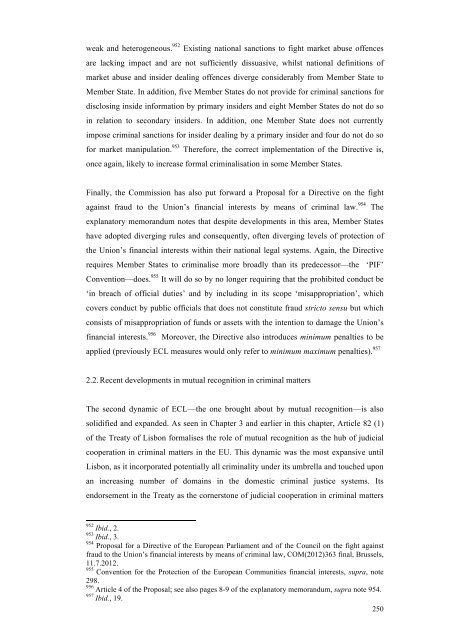The evolution of European Union criminal law (1957-2012)
The evolution of European Union criminal law (1957-2012)
The evolution of European Union criminal law (1957-2012)
Create successful ePaper yourself
Turn your PDF publications into a flip-book with our unique Google optimized e-Paper software.
weak and heterogeneous. 952 Existing national sanctions to fight market abuse <strong>of</strong>fences<br />
are lacking impact and are not sufficiently dissuasive, whilst national definitions <strong>of</strong><br />
market abuse and insider dealing <strong>of</strong>fences diverge considerably from Member State to<br />
Member State. In addition, five Member States do not provide for <strong>criminal</strong> sanctions for<br />
disclosing inside information by primary insiders and eight Member States do not do so<br />
in relation to secondary insiders. In addition, one Member State does not currently<br />
impose <strong>criminal</strong> sanctions for insider dealing by a primary insider and four do not do so<br />
for market manipulation. 953 <strong>The</strong>refore, the correct implementation <strong>of</strong> the Directive is,<br />
once again, likely to increase formal <strong>criminal</strong>isation in some Member States.<br />
Finally, the Commission has also put forward a Proposal for a Directive on the fight<br />
against fraud to the <strong>Union</strong>’s financial interests by means <strong>of</strong> <strong>criminal</strong> <strong>law</strong>. 954 <strong>The</strong><br />
explanatory memorandum notes that despite developments in this area, Member States<br />
have adopted diverging rules and consequently, <strong>of</strong>ten diverging levels <strong>of</strong> protection <strong>of</strong><br />
the <strong>Union</strong>’s financial interests within their national legal systems. Again, the Directive<br />
requires Member States to <strong>criminal</strong>ise more broadly than its predecessor—the ‘PIF’<br />
Convention—does. 955 It will do so by no longer requiring that the prohibited conduct be<br />
‘in breach <strong>of</strong> <strong>of</strong>ficial duties’ and by including in its scope ‘misappropriation’, which<br />
covers conduct by public <strong>of</strong>ficials that does not constitute fraud stricto sensu but which<br />
consists <strong>of</strong> misappropriation <strong>of</strong> funds or assets with the intention to damage the <strong>Union</strong>’s<br />
financial interests. 956 Moreover, the Directive also introduces minimum penalties to be<br />
applied (previously ECL measures would only refer to minimum maximum penalties). 957<br />
2.2. Recent developments in mutual recognition in <strong>criminal</strong> matters<br />
<strong>The</strong> second dynamic <strong>of</strong> ECL—the one brought about by mutual recognition—is also<br />
solidified and expanded. As seen in Chapter 3 and earlier in this chapter, Article 82 (1)<br />
<strong>of</strong> the Treaty <strong>of</strong> Lisbon formalises the role <strong>of</strong> mutual recognition as the hub <strong>of</strong> judicial<br />
cooperation in <strong>criminal</strong> matters in the EU. This dynamic was the most expansive until<br />
Lisbon, as it incorporated potentially all <strong>criminal</strong>ity under its umbrella and touched upon<br />
an increasing number <strong>of</strong> domains in the domestic <strong>criminal</strong> justice systems. Its<br />
endorsement in the Treaty as the cornerstone <strong>of</strong> judicial cooperation in <strong>criminal</strong> matters<br />
952 Ibid., 2.<br />
953 Ibid., 3.<br />
954 Proposal for a Directive <strong>of</strong> the <strong>European</strong> Parliament and <strong>of</strong> the Council on the fight against<br />
fraud to the <strong>Union</strong>’s financial interests by means <strong>of</strong> <strong>criminal</strong> <strong>law</strong>, COM(<strong>2012</strong>)363 final, Brussels,<br />
11.7.<strong>2012</strong>.<br />
955 Convention for the Protection <strong>of</strong> the <strong>European</strong> Communities financial interests, supra, note<br />
298.<br />
956 Article 4 <strong>of</strong> the Proposal; see also pages 8-9 <strong>of</strong> the explanatory memorandum, supra note 954.<br />
957 Ibid., 19.<br />
250
















